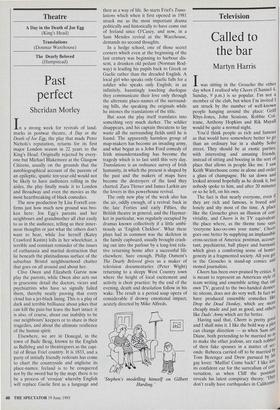Theatre
A Day in the Death of Joe Egg (King's Head) Translations (Donmar Warehouse) The Dearly Beloved (Hampstead)
Past perfect
Sheridan Morley
In a strong week for revivals of land- marks in postwar theatre, A Day in the Death of Joe Egg, the play that made Peter Nichols's reputation, returns for its first major London season in 22 years to the King's Head. Originally rejected by every- one but Michael Blakemore at the Glasgow Citizens, usually on the grounds that the autobiographical account of the parents of an epileptic, spastic ten-year-old would not be likely to have audiences rolling in the aisles, the play finally made it to London and Broadway and even the movies as the most heartbreaking of black comedies.
The new production by Lisa Forrell con- firms just how much new ground was bro- ken here: Joe Egg's parents and her neighbours and grandmother all chat easily to us in the audience, telling us their inner- most thoughts or just what the others don't want to hear, while Joe herself (Katey Crawford Kastin) lolls in her wheelchair, a terrible and constant reminder of the issues of euthanasia and marital destruction that lie beneath the platitudinous surface of the suburban Bristol neighbourhood chatter that goes on all around and about her.
Clive Owen and Elizabeth Garvie now play the parents, while Owen also acts out in gruesome detail the doctors, vicars and psychiatrists who have so signally failed them, thereby neatly proving that every cloud has a jet-black lining. This is a play of dark and terrible brilliance about jokes that can kill the pain but leave the hurt intact: it is also, of course, about our inability to be our neighbours' keepers or to share in their tragedies, and about the ultimate resilience of the human spirit.
Elsewhere, we are in Donegal, in the town of Baile Beag, known to the English as Ballybeg and to theatregoers as the capi- tal of Brian Friel country. It is 1833, and a party of initially friendly redcoats has come to chart the countryside and anglicise its place-names. Ireland is to be conquered not by the sword but by the map; there is to be a process of 'erosion' whereby English will replace Gaelic first as a language and
then as a way of life. So starts Friel's Trans- lations which when it first opened in 1981 struck me as the most important drama politically and historically to have come out of Ireland since O'Casey, and now, in a Sam Mendes revival at the Warehouse, demands no second thoughts.
In a hedge school, one of those secret corners which even at the beginning of the last century was beginning to harbour dis- sent, a drunken old pedant (Norman Rod- way) is leading his pupils back to Greek or Gaelic rather than the dreaded English. A local girl who speaks only Gaelic falls for a soldier who speaks only English; in an infinitely, hauntingly touching duologue they communicate their love only through the alternate place-names of the surround- ing hills, she speaking the originals while he intones the translations of the title.
But soon the play itself translates into something very much darker. The soldier disappears, and his captain threatens to lay waste all the surrounding fields until he is found. The apparently harmless group of map-makers has become an invading army, and what began as a John Ford comedy of Irish misunderstanding has become the tragedy which is to last until this very day. Translations is an ordnance survey of Irish humanity, in which the present is shaped by the past and the makers of maps have become the destroyers of the land they charted. Zara -Firmer and James Larkin are the lovers in this powerhouse revival.
The only new play of the week also has the air, oddly enough, of a revival: back in the late Forties and early Fifties, the British theatre in general, and the Haymar- ket in particular, was regularly occupied by dramas known collectively if a little ambi- tiously as 'English Chekhov'. What these plays had in common was the skeleton in the family cupboard, usually brought crash- ing out into the parlour by a long-lost rela- tive returning home after a successful life elsewhere. Sure enough, Philip Osment's The Dearly Beloved gives us a maker of television documentaries (Peter Wight) returning to a sleepy West Country town where the height of local excitement and activity is choir practice: by the end of the evening, death and desolation follow in his wake. The result is a period soap opera of considerable if drowsy emotional impact, acutely directed by Mike Alfreds.
`Stephen's modelling himself on Gilbert Harding.'


















































 Previous page
Previous page